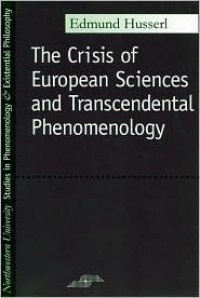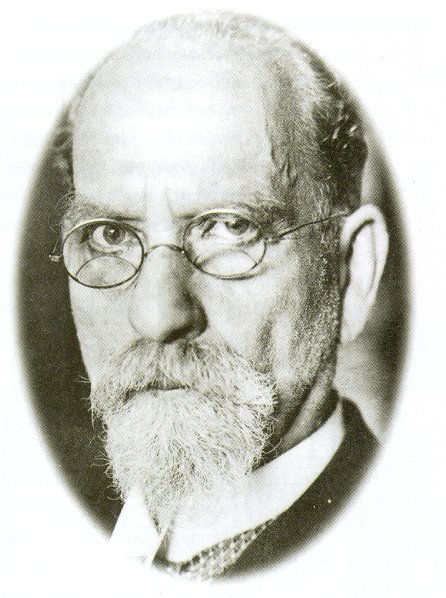Currently reading
The Crisis of European Sciences and Transcendental Phenomenology , by Edmund Husserl


A philosopher's desperate play for relevance in 1935/36.
Edmund Husserl (1859-1938) is regarded as the founder of (philosophical) phenomenology, an extremely influential development of modern philosophy which tries to capture the nature of the Subject through a combination of close description and transcendental theorizing.
The word "phenomenology" literally means the study of phenomena. When an elementary particle physicist speaks of phenomenology, what he refers to is a description of the experimentally observed behavior of elementary particles, already (necessarily) partially interpreted - for example, "when a proton collides with an antiproton, then this, this and this happens" - but without a thorough theoretical "explanation." The word is in use in a number of fields, including philosophy, though the resemblance of the various flavors of phenomenology is often hard to make out. Compare, for example, the physicist's phenomenology with Husserl's, for whom phenomenology was “the science of the essence of consciousness.” But all of them try to provide as minimally a theory laden description of "reality" as possible, at least in principle.
The phenomenologist reveals himself in his choice of fundamental phenomenon - in the near infinitude of phenomena, where does he focus his eye first, which is the key he uses to unlock the door of "reality"? Since it is our own conscious sensations to which we have the most direct access with the least amount of adduced concepts, in an attempt to strip away from "reality" the thick veneer of conceptualization, the many layers of intervening concepts and modes of regarding "reality" which have been built up over the ages by human beings trying to understand that "reality" and then to try to recognize "reality" for what it "really is," the focus of the philosophical phenomenologist is on various aspects of experienced consciousness in relation to that which is outside that consciousness. That, too, is a vast expanse.
Die Krisis der europäischen Wissenschaften und die transzendentale Phänomenologie (1936) (*) is the last text Husserl published, though much has been subsequently published from his Nachlass.(**) It provides a foretaste of a new turn in his thought, which is developed further (but incompletely) in posthumously published texts. I'm in no position to give an overview of Husserl's oeuvre here, so I'll just try to cast an idea of what Husserl does in this piece.
Subtitled "An Introduction to Phenomenological Philosophy," Krisis begins with a picture of the history of philosophy in which, for the Greeks, philosophy was a unity that contained all subfields of knowledge, a unity that was regained during the Renaissance's attempt to resurrect antique thought and was still maintained through the 18th century's Enlightenment. However, the contrast between the cumulative successes of the hard sciences (still called natural philosophy in the 18th century) and the apparent lack of progress with the metaphysical and ethical problems left in philosophy's hands became hard to overlook for the few true philosophers who remained. Indeed, the prospect, the ideal of a universal philosophy that could provide mankind with all the answers began to crumble, and though this did not directly affect the practical and theoretical successes of the hard sciences, it threatened their deeper, original purposes. Husserl claims, in fact, that since the Renaissance "European mankind," after discarding the message of value, sense and purpose provided in the Middle Ages by Christianity, was obliged to seek the same in this universal philosophy. And since the latter was crumbling, European mankind was itself in crisis.
Horrified by the growing irrationality, mysticism and violence around him, Husserl tried to find a solution (or at least tried to suggest to the despairing a possible solution in the very, very long term) in a modification of his own philosophical phenomenology. In an attempt to return to a totalizing, universal philosophy that includes all branches of knowledge as subfields and that again privileges reason, Husserl spends almost all of the text reviewing the development of philosophy and the sciences since the Renaissance while emphasizing his view that the sciences, in their specialized and undeniable successes, had become a technical art alienated from its roots and had, in effect, thrown the baby out with the bath water in their emphasis on objectivity, on eliminating the Subjective from their domains. In the process Husserl tries to motivate the ineluctable necessity of what he calls a "radical transcendental Subjectivism," which, however, he does not describe in this text...
We'll see how much of his vision of a radical Subjectivism he was able to work out in the year or so of life that was left to him; for this it will be necessary to read the posthumously published works. What is certain is that (1) his earlier works on the transcendental Subjectivism which is his philosophical phenomenology have been extremely influential, and (2) this particular text, this introduction that only alludes vaguely to the topic being introduced, this particular text I take to be Husserl's defiant pledge of allegiance to the hoary Western philosophical tradition based on reason, a pledge cast into the face of a world swiftly going mad and preparing to tear the flesh off its own body in the name of ideologies of power and hate.
(*) Available in English translation under the title The Crisis of European Sciences and Transcendental Phenomenology.
(**) Because the Nazis had forbidden him to publish in Germany, Krisis first appeared in a journal based in Belgrade. Though baptized as a Lutheran in 1886, Husserl was born to Jewish parents, and that was more than sufficient for a Publikationsverbot.
 5
5












